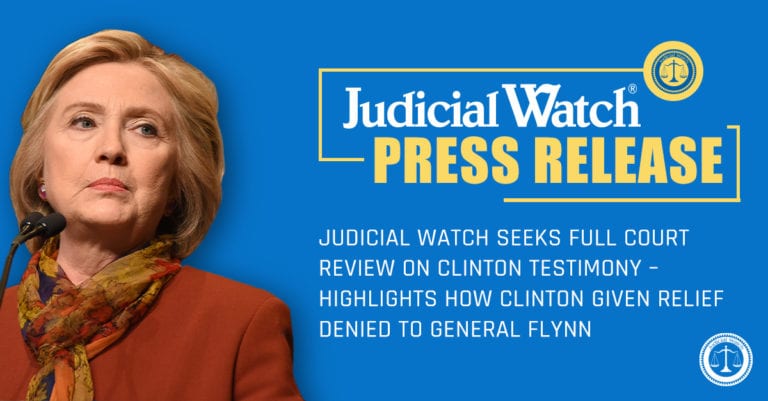
Judicial Watch Seeks Full Court Review on Clinton Testimony – Highlights How Clinton Given Relief Denied to General Flynn

(Washington, DC) Judicial Watch announced today that it filed a petition for panel rehearing and rehearing en banc in the United States Court of Appeals for the District of Columbia concerning the deposition of former Secretary of State Hillary Clinton in a Freedom of Information Act (FOIA) lawsuit relevant to her government emails (In re Hillary Rodham Clinton and Cheryl Mills (No. 20-5056)).
Judicial Watch filed its petition after an August 31, 2020, opinion by the Court of Appeals granted Clinton’s petition for mandamus relief, allowing her to avoid giving sworn testimony in Judicial Watch’s lawsuit seeking records about the Obama administration’s public statements regarding the 2012 terrorist attack on the U.S. consulate in Benghazi. The lawsuit led directly to the disclosure of Clinton’s email use (Judicial Watch v. U.S. Department of State (No. 1:14-cv-01242)).
Judicial Watch argues the appeals panel granted Clinton extraordinary relief that was specifically denied to General Flynn by the full appeals court. The full appeals court, in denying General Flynn mandamus relief, ruled that he could pursue alternative remedies for relief, such as an appeal of any adverse decision by the lower court at the end of his criminal case. The panel treated Clinton differently:
The panel’s failure to consider Clinton’s available remedies when it labeled her a party-litigant has, in effect, extended more rights to Clinton than to ordinary parties, including Plaintiff, the Government, and most recently Flynn. Rehearing and rehearing en banc is necessary for this additional reason.
***
It also is at odds with this Court’s recent en banc decision denying mandamus to U.S. Army Lieutenant General Michael T. Flynn because an “adequate alternative remedy exists.” Rehearing and rehearing en banc is necessary “to secure and maintain uniformity of the court’s decisions.”
Judicial Watch further argues that the ruling undermines FOIA by ignoring Supreme Court and other precedent:
A district court may order limited discovery in FOIA cases where there is evidence that an agency acted in bad faith. A district court also has “broad discretion to manage the scope of discovery” in FOIA cases. The panel nonetheless found that discovery in FOIA is limited to “the actions of the individuals who conducted the search” for records responsive to a request. The panel’s finding is a radical departure from what Congress intended, the Supreme Court’s interpretation of FOIA, and this Court’s precedent. In effect, it eliminates any discovery into the actions of agency officials or employees other than FOIA officers, walling off from any inquiry officials or employees who may be less than honest with FOIA officers or who might seek to conceal agency records from FOIA officers to prevent their disclosure to the public, among other matters plainly relevant to an agency’s good faith in responding to FOIA requests.
Judicial Watch highlights the urgency of the issue by pointing to renewed efforts by the State Department and Justice Department to use the appellate court’s decision to try to shut down all other discovery into Clinton’s email use.
“The decision to give Hillary Clinton special protection from having to testify about her emails undermines the rule of law and would eviscerate FOIA,” stated Judicial Watch President Tom Fitton. “The court should explain to the American people why it would protect Hillary Clinton while denying similar relief to General Flynn.”
On December 6, 2018, U.S. District Court Judge Royce Lamberth ordered that former United States Ambassador to the United Nations Susan Rice and senior Obama State Department officials, lawyers and Clinton aides be deposed or answer written questions under oath in the lawsuit. Judge Lamberth called Clinton’s email system “one of the gravest modern offenses to government transparency.”
In May 2019, Rice admitted under oath that she emailed Clinton on Clinton’s personal email account and “in rare instances” received emails related to U.S. government business on her own personal email account. Rice claimed she “took steps” to ensure that official emails were “also on her government email account” but did not identify those steps. Rice’s 2019 sworn answers are available here.
On March 2, 2020, Judge Lamberth ordered Judicial Watch to depose Clinton and Mills, under oath, regarding Clinton’s email system and the existence of records about the Benghazi attack. Clinton and Mills filed an emergency mandamus appeal to avoid testifying.
###















